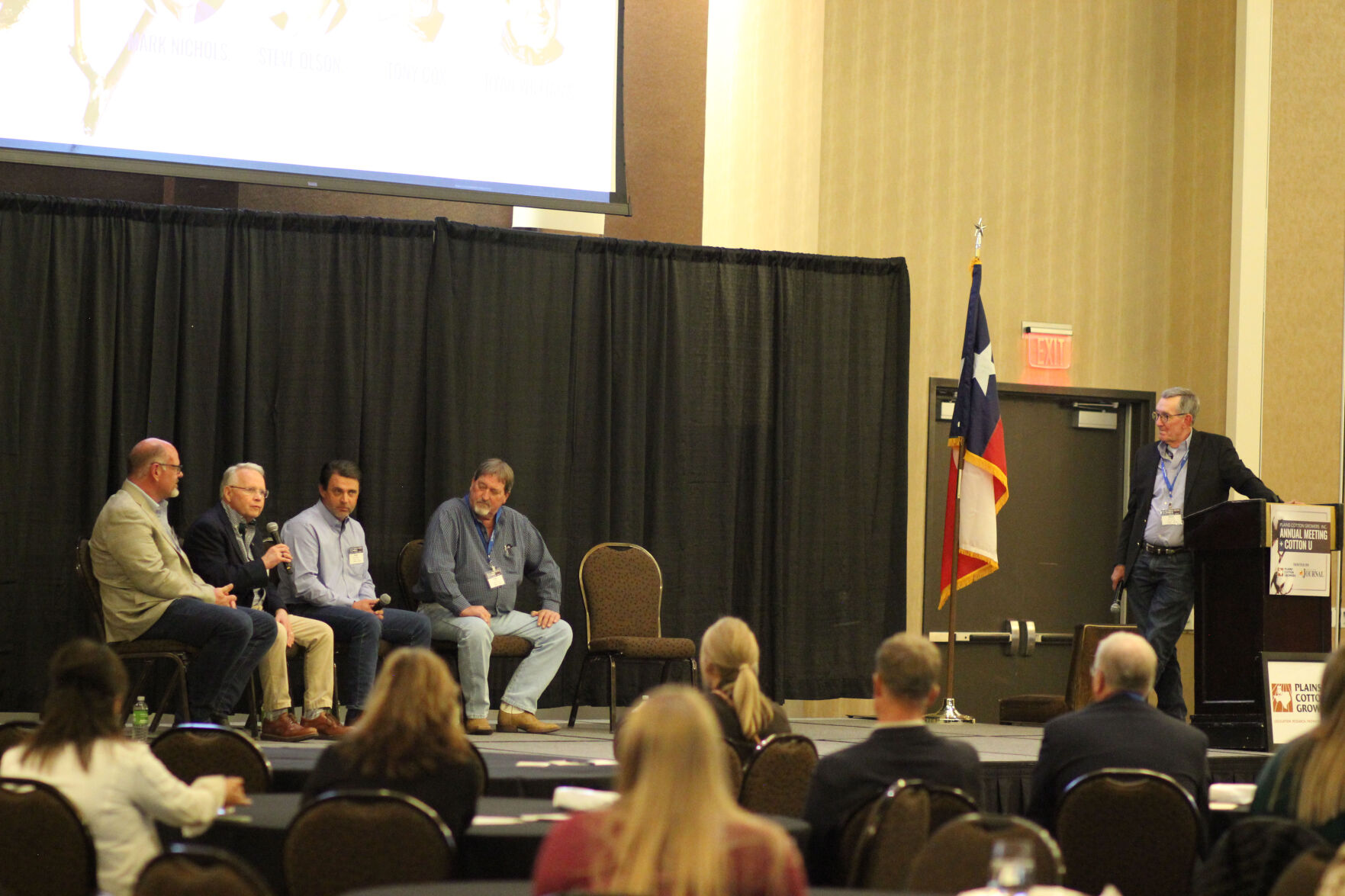Cotton U farmer panelists discuss challenges and opportunities in cotton today

Cotton growers gathered at the Overton Hotel in Lubbock, Texas, recently for the Plains Cotton Growers Annual Meeting and Cotton U and the session that closed out the day was the Cotton U farmer panel. Steve Verett, retired CEO of Plains Cotton Growers and a Crosby County, Texas, cotton farmer, moderated the panel. The panelists included Mark Nichols, Steve Olson, Tony Cox, and Ryan Williams.
Nichols is a fourth-generation cotton farmer from Altus, Oklahoma. He is the current vice chairman of The Cotton Board, member and past vice chairman of American Cotton Producers of the National Cotton Council, vice chairman of the Oklahoma Cotton Council and chairman of Producers Coop Oil Mill. Olson, who farms near Plainview, Texas, has a diversified operation and grows sunflowers, seed sorghum and millet, corn and cotton. Olson also serves on the executive board of Plains Cotton Growers and The Cotton Board. He has been farming for 34 years. Cox of Wellington, Texas, farms with his son in Collingsworth, Childress and Harmon, Texas counties. Two-thirds of his ground is irrigated and about 60% of that is drip irrigation. Williams is a fourth-generation cotton, corn, sorghum, and wheat farmer from Farwell, Texas. His family recently received the High Cotton award for the southwest.
The discussion began when Verett asked the panelists what unique practices they use to improve their cotton production. Olson said his farming operation is different than his neighbors because he focuses on no-till.
“No-till is the goal, but we also know that if you take care of what’s below the soil, it’ll take care of what’s above the soil,” he said.
Williams said his family’s operation is different from other cotton farmers because he avoids planting cotton behind cotton.
“Rotation is big on our farm,” he said. “We like to rotate either behind wheat from the previous year or millet or grain sorghum.”
Nichols said he plants half his irrigation pivot in early-sewn sorghum and the other half in cotton. Since the sorghum is planted really early, he is able to water that crop before the cotton starts to need moisture. He then later switches to allocating 100% of the water to the cotton, so he can harvest two good crops on one pivot.
Cox is always looking for out of the box ideas to improve his crops. He got creative and made a seed-bed prepping rig by adapting an older planter into a 16-row contraption to smooth out his seed bed before planting for optimal seed-to-soil contact.
Hills and valleys
Next, Verett asked the panelists the biggest challenges facing farmers right now. Everyone agreed water is the No. 1 concern, but some panelists had some other unique takes on the questions. Nichols said farmers often settle for comfortable marketing strategies that leave money on the table.
“Sometimes as producers we miss marketing opportunities and I think our co-ops and others are coming up with new and more inventive ideas to help us market our cotton, but I think in my area producers have just gotten a little bit complacent in just relying on the pool,” Nichols said. “The pool is never going to be the highest or the lowest, it just tries to get you somewhere in the middle, but I think we miss opportunities sometimes when we rely on that.”
Olson said he worries about young people leaving the farm and never returning.
“A big problem is the brain drain we have in all production agriculture right now, where kids are highly educated and leave the farm, taking that brain power with them,” he said. “I think that’s going to come back and bite us really hard. We’ve got to figure out a way to get our kids in our communities to understand the opportunities available in agriculture.”
Cox said he is extremely concerned about the challenges associated with high interest rates and the geopolitical situation.
“It smells a lot like the 80s,” he explained. “I don’t want to be a pessimist, but it might be time to save your money.”
Williams said he loves growing cotton, but it is by far the most challenging crop he grows, especially the last few years. He said competing crops in his area make it even more difficult to keep planted cotton acres high.
“Where I’m from, there are about 60 dairies and five or six large feedlots about 15 miles from my house,” he explained. “The demand on feed, especially this year, is detrimental to cotton. Cotton is a tough crop and a lot of farmers just don’t like growing. It’s easy to go out there and plant hay grazer or sorghum silage, have someone come chop it and you’re done.”
When the floor was opened for members of the audience to ask questions, one person in the crowd asked the panelists how they define success. Cox quoted Mark Twain in his response and said, “Your vocation should be vacation. That’s success. It’s when you love what you’re doing.”
Sign up for HPJ Insights
Our weekly newsletter delivers the latest news straight to your inbox including breaking news, our exclusive columns and much more.
Lacey Vilhauer can be reached at 620-227-1871 or [email protected].



